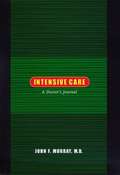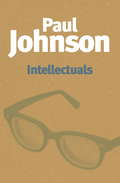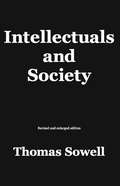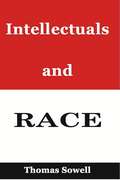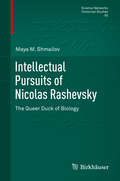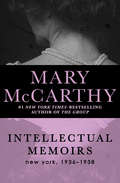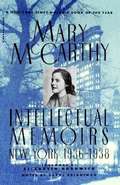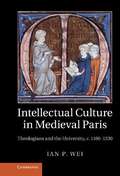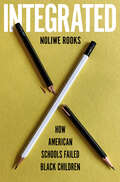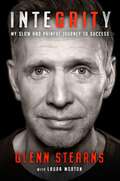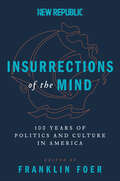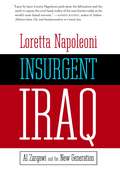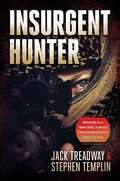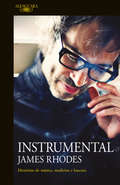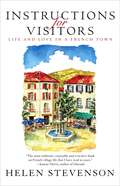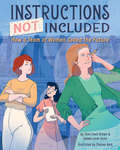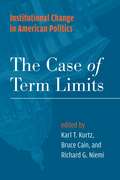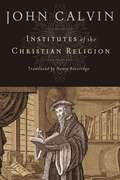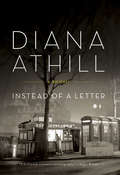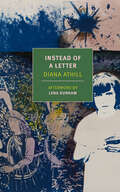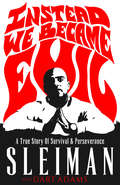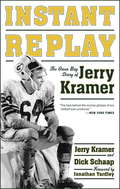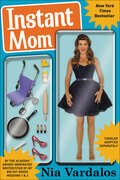- Table View
- List View
Intensive Care: A Doctor's Journal
by John F. MurrayA day-by-day, minute-by-minute account of life in the intensive care unit of a major inner-city hospital, San Francisco General. Murray (medicine, U. of California--San Francisco) escorts readers on his daily ward rounds, introducing them to the desperately ill patients and to the young physicians and medical students who accompany him. They should come away with an understanding of how such wards work on the scientific, mechanical, political, social, and emotional levels.
Intellectuals: A fascinating examination of whether intellectuals are morally fit to give advice to humanity
by Paul JohnsonPaul Johnson examines whether intellectuals are morally fit to give advice to humanity.Do the private practices of intellectuals match the standard of their public principles?How great is their respect for truth? What is their attitude to money? How do they treat their spouses and children - legitimate and illegitimate? How loyal are they to their friends? Rousseau, Shelley, Marx, Ibsen, Tolstoy, Hemingway, Bertrand Russell, Brecht, Sartre, Edmund Wilson, Victor Gollancz, Lillian Hellman, Cyril Connolly, Norman Mailer, Kenneth Tynan and many others are put under the spotlight. With wit and brilliance, Paul Johnson exposes these intellectuals, and questions whether ideas should ever be valued more than individuals.
Intellectuals: A fascinating examination of whether intellectuals are morally fit to give advice to humanity
by Paul JohnsonPaul Johnson examines whether intellectuals are morally fit to give advice to humanity.Do the private practices of intellectuals match the standard of their public principles?How great is their respect for truth? What is their attitude to money? How do they treat their spouses and children - legitimate and illegitimate? How loyal are they to their friends? Rousseau, Shelley, Marx, Ibsen, Tolstoy, Hemingway, Bertrand Russell, Brecht, Sartre, Edmund Wilson, Victor Gollancz, Lillian Hellman, Cyril Connolly, Norman Mailer, Kenneth Tynan and many others are put under the spotlight. With wit and brilliance, Paul Johnson exposes these intellectuals, and questions whether ideas should ever be valued more than individuals.
Intellectuals and the Search for National Identity in Twentieth-Century Brazil
by Ronald H. ChilcoteThis book discusses twentieth-century Brazilian political thought, arguing that while Rio de Janeiro intellectuals envisaged the state and the national bourgeoisie as the means to overcome dependency on foreign ideas and culture, São Paulo intellectuals looked to civil society and the establishment of new academic institutions in the search for national identity. Ronald H. Chilcote begins his study by outlining Brazilian intellectuals' attempt to transcend a sense of inferiority emanating from Brazilian colonialism and backwardness. Next, he traces the struggle for national identity in Rio de Janeiro through an account of how intellectuals of varying political persuasions united in search of a political ideology of national development. He then presents an analysis by São Paulo intellectuals on racial discrimination, social inequality, and class differentiation under early capitalism and industrialization. Lastly, the book concludes with a discussion on how Brazilian intellectuals challenged foreign thinking about development through the state and representative democratic institutions, in contrast to popular and participatory democratic practices.
Intellectuals and Society
by Thomas SowellHow intellectuals as a class affect modern societies by shaping the climate of opinion in which official policies develop--on issues ranging from economics to law to war and peace
Intellectuals and Race
by Thomas SowellIntellectuals and Race is a radical book in the original sense of one that goes to the root of the problem. The role of intellectuals in racial strife is explored in an international context that puts the American experience in a wholly new light. The views of individual intellectuals have spanned the spectrum, but the views of intellectuals as a whole have tended to cluster. Indeed, these views have clustered at one end of the spectrum in the early twentieth century and then clustered at the opposite end of the spectrum in the late twentieth century. Moreover, these radically different views of race in these two eras were held by intellectuals whose views on other issues were very similar in both eras. Intellectuals and Race is not, however, a book about history, even though it has much historical evidence, as well as demographic, geographic, economic and statistical evidence-- all of it directed toward testing the underlying assumptions about race that have prevailed at times among intellectuals in general, and especially intellectuals at the highest levels. Nor is this simply a theoretical exercise. The impact of intellectuals' ideas and crusades on the larger society, both past and present, is the ultimate concern. These ideas and crusades have ranged widely from racial theories of intelligence to eugenics to "social justice" and multiculturalism. In addition to in-depth examinations of these and other issues, Intellectuals and Race explores the incentives, the visions and the rationales that drive intellectuals at the highest levels to conclusions that have often turned out to be counterproductive and even disastrous, not only for particular racial or ethnic groups, but for societies as a whole.
Intellectual Pursuits of Nicolas Rashevsky
by Maya M. ShmailovWho was Nicolas Rashevsky? To answer that question, this book draws on Rashevsky's unexplored personal archival papers and shares interviews with his family, students and friends, as well as discussions with biologists and mathematical biologists, to flesh out and complete the picture. "Most modern-day biologists have never heard of Rashevsky. Why?" In what constitutes the first detailed biography of theoretical physicist Nicolas Rashevsky (1899-1972), spanning key aspects of his long scientific career, the book captures Rashevsky's ways of thinking about the place mathematical biology should have in biology and his personal struggle for the acceptance of his views. It brings to light the tension between mathematicians, theoretical physicists and biologists when it comes to the introduction of physico-mathematical tools into biology. Rashevsky's successes and failures in his efforts to establish mathematical biology as a subfield of biology provide an important test case for understanding the role of theory (in particular mathematics) in understanding the natural world. With the biological sciences moving towards new vistas of inter- and multi-disciplinary collaborations and research programs, the book will appeal to a wide readership ranging from historians, sociologists, and ethnographers of American science and culture to students and general readers with an interest in the history of the life sciences, mathematical biology and the social construction of science.
Intellectual Memoirs: New York, 1936–1938
by Mary McCarthyIn this no-holds-barred memoir with a foreword by Elizabeth Hardwick, the bestselling author of The Group recalls her early life in New York, revealing the genesis of and genius behind her groundbreaking fiction Mary McCarthy is a married twenty-four-year-old Communist and critic when this memoir begins. She&’s disciplined, dedicated, and sexually experimental: At one point she realizes that in twenty-four hours she &“had slept with three different men.&” But she believes in the institution of marriage. Over the course of three years, she will have had two husbands, the second being the esteemed, much older critic Edmund Wilson. It is Wilson who becomes McCarthy&’s mentor and muse, urging her to try her hand at fiction.McCarthy&’s powers of observation are on witty display here, as the seventy-something writer recalls events that took place half a century earlier. Her eye for the revealing detail will be recognized by readers of her novels as she describes marching in May Day parades, attending parties for the Scottsboro Boys, and witnessing firsthand the American left wing&’s response to the Moscow trials and the Spanish Civil War.Picking up where How I Grew left off and unfinished at the time of her death in 1989, Intellectual Memoirs is a vivid snapshot of a distinctive place and time—New York in the late 1930s—and the forces that shaped Mary McCarthy&’s life as a woman and a writer.This ebook features an illustrated biography of Mary McCarthy including rare images from the author&’s estate.
Intellectual Memoirs: New York, 1936-1938
by Mary MccarthyMary McCarthy vividly recalls her early years in New York before she began writing novels and stories. At that time, she wrote reviews for the Nation and the New Republic, was active in the American Communist Party, and was married to activist actor/playwright Harold Johnsrud.
Intellectual Culture in Medieval Paris
by Ian P. WeiIn the thirteenth century, the University of Paris emerged as a complex community with a distinctive role in society. This book explores the relationship between contexts of learning and the ways of knowing developed within them, focusing on twelfth-century schools and monasteries, as well as the university. By investigating their views on money, marriage and sex, Ian Wei reveals the complexity of what theologians had to say about the world around them. He analyses the theologians' sense of responsibility to the rest of society and the means by which they tried to communicate and assert their authority. In the late thirteenth and early fourteenth centuries, however, their claims to authority were challenged by learned and intellectually sophisticated women and men who were active outside as well as inside the university and who used the vernacular – an important phenomenon in the development of the intellectual culture of medieval Europe.
Integrated: How American Schools Failed Black Children
by Noliwe RooksA powerful, incisive reckoning with the impacts of school desegregation that traces four generations of the author&’s family to show how the implementation of integration decimated Black school systems and did much of the Black community a disserviceOn May 17, 1954 the landmark case Brown v. Board of Education determined that racial segregation in schools was unconstitutional. Heralded as a massive victory for civil rights, the decision's goal was to give Black children equitable access to educational opportunities and clear a path to a better future. Yet in the years following the ruling, schools in predominantly Black neighborhoods were shuttered or saw their funding dwindle, Black educators were fired en masse, and Black children faced discrimination and violence from their white peers as they joined resource-rich schools that were ill-prepared for the influx of new students.Award-winning interdisciplinary scholar of education and Black history Noliwe Rooks weaves together sociological data and cultural history to challenge the idea that integration was a boon for Black children. She tells the story of her grandparents, who were among the thousands of Black teachers fired following the Brown decision; her father, who was traumatized by his experiences at an almost exclusively-white school; her own experiences moving from a flourishing, racially diverse school to an underserved inner-city one; and finally her son and his Black peers, who over half-century after Brown still struggle with hostility and prejudice from white teachers and students alike. She also shows how present-day discrimination lawsuits directly stem from the mistakes made during integration.At once assiduously researched and deeply engaging, Integrated tells the story of how education has remained both a tool for community progress and a seemingly inscrutable cultural puzzle. Rooks' deft hand turns the story of integration's past and future on it's head, and shows how we may better understand and support generations of students to come.
InteGRITy: My Slow and Painful Journey to Success
by Glenn StearnsFrom underdog in life to starring in Discovery Channel&’s Undercover Billionaire, Glenn Stearns is a rags-to-riches story that shows what can be accomplished with unbridled grit and fierce determination.Growing up in a low-income suburb of Baltimore, Maryland, Glenn Stearns attributes optimism, hope, hard work, and unforgettable mentors as the indelible influences that helped him break free from hardship, overcome numerous challenges, and dare to live his wildest dreams. Stearns believes that it does not matter where you grew up, how little money you have, or even how many mistakes you have made—everyone has the potential to turn their life around and make their dreams come true. That's the core belief and incredible life of Glenn Stearns and what InteGRITy is all about. Filled with memorable anecdotes from his roller coaster life and career, InteGRITy is a story about adversity, pain, attitude, and action. Glenn shares the lessons learned in his life, both personally and professionally, that helped him become the wildly successful business leader he is today. Through this story, he hopes to inspire others and leave a legacy built on kindness.
Insurrections of the Mind: 100 Years of Politics and Culture in America
by Franklin FoerTo commemorate the 100th anniversary of The New Republic, an extraordinary anthology of essays culled from the archives of the acclaimed and influential magazineFounded by Herbert Croly and Walter Lippmann in 1914 to give voice to the growing progressive movement, The New Republic has charted and shaped the state of American liberalism, publishing many of the twentieth century’s most important thinkers.Insurrections of the Mind is an intellectual biography of this great American political tradition. In seventy essays, organized chronologically by decade, a stunning collection of writers explore the pivotal issues of modern America. Weighing in on the New Deal; America’s role in war; the rise and fall of communism; religion, race, and civil rights; the economy, terrorism, technology; and the women’s movement and gay rights, the essays in this outstanding volume speak to The New Republic’s breathtaking ambition and reach. Introducing each article, editor Franklin Foer provides colorful biographical sketches and amusing anecdotes from the magazine’s history. Bold and brilliant, Insurrections of the Mind is a celebration of a cultural, political, and intellectual institution that has stood the test of time.Contributors include: Virginia Woolf, Vladimir Nabokov, George Orwell, Graham Greene, Philip Roth, Pauline Kael, Michael Lewis, Zadie Smith, William Faulkner, Ralph Ellison, James Wolcott, D. H. Lawrence, John Maynard Keynes, Langston Hughes, John Updike, and Margaret Talbot.
Insurgent Iraq: Al Zarqawi and the New Generation
by Loretta Napoleoni Jason Burke Nick FieldingAn unparalleled look into the Iraqi insurgency and the multitude of forces that continue to shape it, Insurgent Iraq: Al-Zarqawi and the New Generation presents a chilling account of the regrouping of terror networks, and the development of an Iraqi resistance since the invasion by coalition forces over two years ago. One of the world's leading specialists on terrorism, economist Loretta Napoleoni is uniquely qualified to make sense of the ways in which terror networks do and do not operate in Iraq, and what role they play in the Iraqi resistance. Is the insurgency in Iraq a counter-Crusade, a national liberation movement, or a civil war? With a complex understanding of all the intricacies inherent in such a question, Napoleoni provides a mindful discussion, offering a much-needed understanding of how the US occupation of Iraq has catalyzed the cultural, religious, and political divides within the country to create a wholly changed, more volatile landscape. Composed of independent Iraqi Jihadist groups, Islamo-Nationalist and Ba'ath party resistance, ethnic infighting between Sunni, Shi'ite and Kurd, and foreign suicide bombers, the resistance is a divided yet maintains one demand: the end of US occupation. Overall, Napoleoni offers a breakdown of the current political landscape in Iraq, and a renovated al-Qaeda. Insurgent Iraq is a necessary read for anyone concerned with the future of Iraq, or seeking greater insight into the U.S.'s critical role in the Middle East.
Insurgent Hunter: Memoirs of a Navy SEAL Turned Counterinsurgent Agent in Iraq
by Stephen Templin Jack TreadwayWhen you hunt men, men will hunt you.In this epic thrill ride filled with triumph and tragedy, Jack Treadway takes readers deep into the shadows of covert warfare. As a new SEAL learning to hunt men, a clandestine mini wet submarine comes within inches of slicing and dicing him. In SEAL Team Five, he shuffles through a vomit-spewed C-130 transport plane to jump into something worse—a treacherous snowy mountain in the Korean peninsula. Then he breaks his back in a Special Mission Unit assignment and breaks away from the SEAL Teams. Jack stalks deeper into the darkness from SEAL to Office of Special Investigations (OSI) counterintelligence officer in Iraq. His most elusive prey is a high value target on the kill or capture list—an al Qaeda financier codenamed Kaiser Soze. Jack and his team remove more than a hundred enemy insurgents from the battle space. When a high-ranking Iraqi ally—who secretly works for Iran—kills three members of Jack&’s team, he wants bloody revenge.
Instrumental: A Memoir Of Madness, Medication, And Music
by James RhodesAs memórias de um aclamado pianista que se salvou do inferno da depressão e do abuso graças à música. Uma inspiradora história de redenção. Mais de 100 mil leitores se deixaram tocar por este testemunho de superação. «Abusaram de mim aos seis anos. Internaram-me num hospital psiquiátrico. Fui viciado em drogas e álcool. Tentei suicidar-me cinco vezes. Separaram-me do meu filho. Mas não vou falar disso. Vou falar de música. Porque Bach salvou-me a vida. E eu amo a vida.» James confiava naquele homem simpático. Porque não haveria de confiar? Era seu professor na escola primária. A primeira oferta foi uma caixa de fósforos, um maravilhoso objecto de desejo para um menino de seis anos. Seguiram-se outros pequenos presentes, acompanhados de sorrisos, palavras de incentivo, gestos atenciosos. Depois começaram os abusos sexuais, que duraram vários anos, sem que ninguém na escola e na família se apercebesse. Quando terminaram, James afundou-se progressivamente num abismo de relações obsessivas, hospitais psiquiátricos e vícios destrutivos, uma espiral que o afastou do piano, para o qual revelara talento precoce. Mas foi um adágio de Bach, escutado durante um internamento, que o salvou de anos no fundo do poço. Ao descobrir que também os génios por trás das mais sublimes composições eram homens com existências dramáticas, James encontrou nos pequenos milagres da música o reduto para sobreviver aos seus demónios pessoais. Um encontro inesperado com um desconhecido deu-lhe o impulso de que James precisava para reencontrar o seu caminho na música. Hoje é um pianista aclamado em todo o mundo. Instrumental é um testemunho apaixonado e apaixonante, negro e luminoso, sobre o poder terapêutico da música e a sua capacidade de transformar as nossas vidas, mas também, e sobretudo, sobre a nossa capacidade de reinvenção. Os elogios da crítica: «Rhodes prova que a arte e a beleza podem ajudar; prova que a vida pode ser conquistada dia a dia.»El País «Estávamos a precisar deste livro.»Huffington Post UK «O que distingue este livro é a forma como ele confronta os aspectos indizíveis do abuso sexual das crianças e das doenças mentais... Muitos destes pensamentos são tabu e é preciso clareza, coragem e inteligência para os expressar de forma tão directa e honesta como Rhodes faz.»Independent «Bem escrito, coloquial, tão excitante quanto devastador. Como documento dos efeitos do abuso de crianças é, provavelmente, insuperável.»Sunday Times «Nunca li um testemunho tão sábio sobre o que é ser-se vítima... É visceral e palpável... Das páginas mais impactantes que li nos últimos tempos.»Scotland on Sunday «Uma obra impressionante. Combina uma precisão vívida e obsessiva com uma energia torrencial.»Guardian «Uma leitura dura, avassaladora.»The Times «Poderoso.»New Statesman «Uma vida que tinha de ficar registada.»Spectator
Instructions for Visitors: Life and Love in a French Town
by Helen StevensonWhen living abroad, there are two rules to be followed: 1—If you are lucky enough to find a place you belong, you should never actually live there. And 2—Never live with a man you think you could never live without. But then, what fun would that be? In this funny, forthright, and charming memoir, Helen Stevenson chronicles her experiences as a young British expatriate living in the countryside of France. With emotional depth and lyrical sensitivity, Stevenson introduces readers to the myriad residents of the quaint hamlet known only as "le village." There's Stefan, the Maoist tennis buff, who has his own unique way of showing empathy for the masses; Gigi, the chic Parisian who uses her boutique to dress her ex-lovers' girlfriends; and Luc, the cowboy painter and part-time dentist, who, overcoming his aversion to blondes, becomes enamored of the Englishwoman who has been warmly embraced by the rural community. But her troubled love affair with this local lothario comes to represent the poignant truth: she is still, somehow, an outsider. Luc reminds her: "Le village, c'est moi," and she can never say the same. Evoking the languid, sensual essence of Mediterranean France, Instructions for Visitors is a very personal revelation of the wonders and the difficulties of relocating one's home—and one's heart.
Instructions Not Included: How a Team of Women Coded the Future
by Tami Lewis BrownClick. Whir. Buzz.Not so long ago, math problems had to be solved with pencil and paper, mail delivered by postman, and files were stored in paper folders and metal cabinets. But three women, Betty Snyder, Jean Jennings, and Kay McNulty knew there could be a better way. During World War II, people hoped ENIAC (Electronic Numerical Integrator and Computer), one of the earliest computers, could help with the war effort. With little guidance, no instructions, and barely any access to the machine itself, Betty, Jean, and Kay used mathematics, electrical engineering, logic, and common sense to command a computer as large as a room and create the modern world. The machine was like Betty, requiring outside-the-box thinking, like Jean, persistent and consistent, and like Kay, no mistakes, every answer perfect. Today computers are all around us, performing every conceivable task, thanks, in large part, to Betty, Jean, and Kay's pioneering work. Instructions Not Included is their story.This fascinating chapter in history is brought to life with vivid prose by Tami Lewis Brown and Debbie Loren Dunn and with striking illustrations by Chelsea Beck. Detailed back matter including historical photos provides a closer look.
Institutional Change in American Politics
by Karl T. Kurtz Bruce Cain Richard G. NiemiThe 12 chapters presented here by Kurtz (director of the Trust for Representative Democracy at the National Conference of State Legislatures), Cain (political science, U. of California at Berkeley), and Niemi (political science, U. of Rochester) collectively provide a comparative examination of the impact of term limits on state legislatures in the United States, focusing more on effects on the organization and operation of the legislatures than on the effects of turnover on the kinds of individuals elected, although that is discussed in the opening chapters. Other chapters examine leadership selection and tenure; the attitudes of legislators towards their jobs; the decline of the roles of committees in obtaining independent information, serving as a forum for deliberation, and regulating the flow of bills to the legislature; impacts on legislative staff; legislator interrelations; lobbyist influence; legislature-executive relations; and legislator learning and training. Annotation ©2008 Book News, Inc. , Portland, OR (booknews. com)
Institutes of the Christian Religion
by John Calvin Jean Calvin Henry BeveridgeA colossal milestone of Christian thought―at an irresistible price! Here in a convenient one-volume edition is John Calvin’s magnum opus. Written as an introduction to the Christian life, the Institutes remains the best articulation of Reformation principles and is a marvelous introduction to biblical Christianity. Newly re-typeset for clarity, this volume translated by Henry Beveridge offers a more affordable edition of one of the last millennium’s must-have works. This book will appeal to libraries, seminarians, pastors, and laypeople. <p><p>Institutes of the Christian Religion by John Calvin is an introduction to the Bible and a vindication of Reformation principles by one of the Reformation’s finest scholars. At the age of twenty-six, Calvin published several revisions of his Institutes of the Christian Religion, a seminal work in Christian theology that altered the course of Western history and that is still read by theological students today. It was published in Latin in 1536 and in his native French in 1541, with the definitive editions appearing in 1559 (Latin) and in 1560 (French). The book was written as an introductory textbook on the Protestant faith for those with some learning already and covered a broad range of theological topics from the doctrines of church and sacraments to justification by faith alone. It vigorously attacked the teachings of those Calvin considered unorthodox, particularly Roman Catholicism, to which Calvin says he had been “strongly devoted” before his conversion to Protestantism. The overarching theme of the book―and Calvin’s greatest theological legacy―is the idea of God’s total sovereignty, particularly in salvation and election. <p><p>John Calvin (1509–1564), a French theologian and reformer, was persecuted as a Protestant. As a result, he traveled from place to place. In 1534 at Angouleme he began the work of systematizing Protestant thought in his Institutes of the Christian Religion, one of the most influential theological works of all time.
Instead of a Letter: A Memoir
by Diana AthillA classic memoir by the author of the New York Times bestseller Somewhere Towards the End. As a young woman, Diana Athill was engaged to an air force pilot--Instead of a Letter tells how he broke off the engagement, married someone else, and, worst of all, died overseas before she could confront or forgive him. Evoking perfectly the picturesque country setting of her youth, this fearless and profoundly honest story of love and modern womanhood marks the beginning of Athill's brilliant literary career.
Instead of a Letter
by Diana AthillWhen Diana Athill, nearly forty-three and far from a household name, sat down to write Instead of a Letter, the first in her series of trailblazing memoirs, she was looking for an answer to the question &“What have I lived for?&” In this searching book, she recalls her child-hood on her grandparents&’ magnificent estate, the teenage romance that was certain to lead to marriage, her university days coinciding with the Second World War, and the sudden dissolution of her engagement, a loss that became the defining experience of the next twenty years of her life. Athill is as forthright in confessing her faults as she is in celebrating her triumphs. &“From this table, with this white tea-cup, full ashtray, and small glass half full of rum beside me,&” she writes, &“I see my story, ordinary enough though it has all been and sad though much of it was, as a success story.&”
Instead We Became Evil: A True Story Of Survival & Perseverance
by Sleiman Dart AdamsA powerful story of struggle, survival, and hope for the future is told by one of Denmark's most successful artists. The violent, compelling debut, co-written with journalist Dart Adams, provides a complex portrait of one man and the various ways in which every social system that was supposed to help him failed him, while also delving into the psychology of immigrant gangs and the young men who fall into them. But ultimately, it's a narrative about tenacity, survival, and optimism for the future. Sleiman was born in Lebanon during the 1982 bombardment and is a Palestinian. His family eventually moved to Denmark, but their new life there was far from perfect. Sleiman was subjected to domestic violence as well as social rejection as a Muslim immigrant. Angry and powerless, he found himself drawn to gang life.Sleiman had dropped out of school and was one of his gang's most feared and revered members as a teenager. He was involved in hundreds of crimes during his peak, but after surviving an attempted assassination, he addressed his demons and permanently abandoned the gang life. Sleiman is now narrating his story in his own words in the hopes of discouraging others from following in his footsteps.
Instant Replay: The Green Bay Diary of Jerry Kramer
by Dick Schaap Jerry KramerINSTANT REPLAY spent thirty-seven weeks on The New York Times Bestseller List when it was published in 1968. The perceptive and highly entertaining diary of the 1967 season by Jerry Kramer, a Packer offensive guard, it remains the most beloved and highly regarded portrait of life on a pro football team back when the game was all blood, grit, and tears. This new hardcover edition features classic photos of both the team and its unforgettable coach, Vince Lombardi, and a foreword in which Washington Post book critic Jonathan Yardley calls the diary "the best inside account of pro football, indeed the best book ever written about that sport and that league. " INSTANT REPLAY is a must-read for all fans, an irreplaceable reminder of the glory days of pro football.
Instant Mom
by Nia VardalosA New York Times bestseller, Instant Mom is Academy Award-nominated writer/star Nia Vardalos’s true story of becoming a mother through adoption.“Some families are created in different ways but are still, in every way, a family.”Writer and star of My Big Fat Greek Wedding, Nia Vardalos firmly believed she was supposed to be a mom, but Mother Nature and modern medicine had put her in a headlock. So she made a choice that shocked friends, family, and even herself: with only fourteen hours’ notice, she adopted a preschooler.Instant Mom is Vardalos’s poignant and hilarious true chronicle of trying to become a mother while fielding nosy “frenemies” and Hollywood reporters asking, “Any baby news?” With genuine and frank honesty, she describes how she and husband Ian Gomez eventually found their daughter . . . and what happened next. Vardalos explores innovative ways to conquer the challenges all new moms face, from sleep to personal grooming, and learns that whether via biology, relationship, or adoption—motherhood comes in many forms.Featuring laugh-out-loud behind the scenes Hollywood anecdotes, Vardalos candidly shares her instant motherhood story that is relatable for all new moms (and dads!)“If you have ever considered bringing a child who isn’t an infant into your family, it’s the book you’ll want to read. And if you just enjoy a good, honest memoir, it’s the book for you, too.” —New York Times’ Motherlode Blog “Refreshingly candid for all parents-plus anyone considering adoption. We know Nia is many things: writer, actress, director, musical theater lover! Here, though, you learn she is a mom first. Pure, beautiful honesty.” —Kristin Chenoweth
